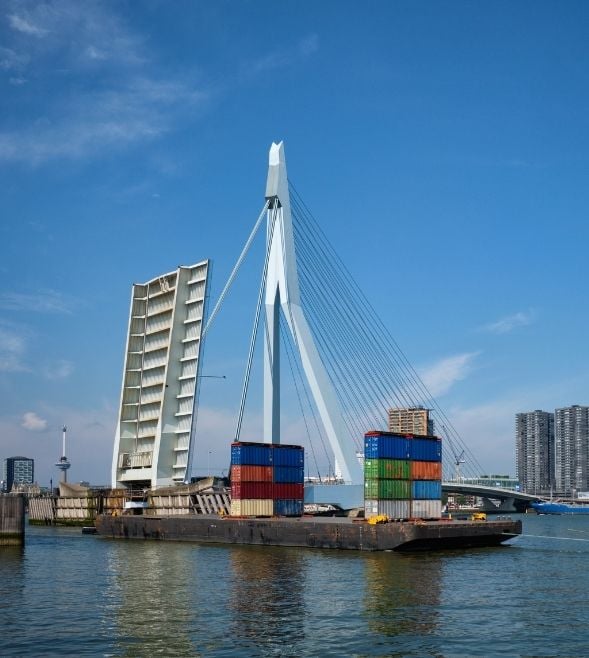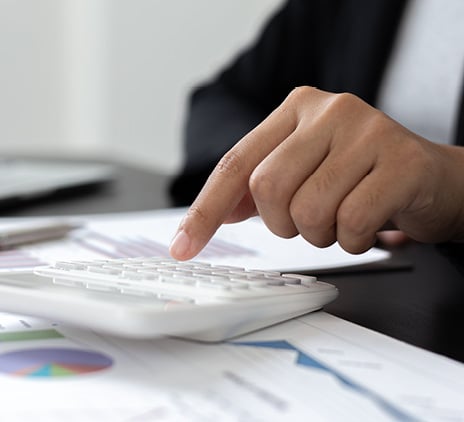-
Financial administration & outsourcing
Entrepreneurs who outsource financial administration reduce the number of administrative tasks and consequently have more time and space to focus on growth.
-
Financial insight
We help you turn financial data into valuable insights that support you in making well-founded decisions. In-depth analyses of your financial situation will help give you a better idea of where you stand and where the opportunities for growth lie, both in the short and long term.
-
Financial compliance
We make sure your company complies with financial legislation and regulations, with correct financial statements, tax reports and other obligations. From our global network, we support you in managing local and international tax risks.
-
Impact House by Grant Thornton
Building sustainability and social impact. That sounds good. But how do you go about it in the complex world of stakeholders, regulations and frameworks and changing demands from clients and society? How do you deal with important issues such as climate change and biodiversity loss?
-
Business risk services
Minimize risk, maximize predictability, and execution Good insights help you look further ahead and adapt faster. Whether you require outsourced or co-procured internal audit services and expertise to address a specific technology, cyber or regulatory challenge, we provide a turnkey and reliable solution.
-
Cyber risk services
What should I be doing first if my data has been kidnapped? Have I taken the right precautions for protecting my data or am I putting too much effort into just one of the risks? And how do I quickly detect intruders on my network? Good questions! We help you to answer these questions.
-
Deal advisory
What will the net proceeds be after the sale? How do I optimise the selling price of my business or the price of one of my business activities?
-
Forensic & integrity services
Do you require a fact finding investigation to help assess irregularities? Is it necessary to ascertain facts for litigation purposes?
-
Valuations
Independent and objective valuations tailored for mergers, acquisitions, and legal matters.
-
Auditing of annual accounts
You are answerable to others, such as shareholders and other stakeholders, with regard to your financial affairs. Financial information must therefore be reliable. What is more, you want to know how far you are progressing towards achieving your goals and what risks may apply.
-
IFRS services
Financial reporting in accordance with IFRS is a complex matter. Nowadays, an increasing number of international companies are becoming aware of the rules. But how do you apply them in practice?
-
ISAE & SOC Reporting
Our ISAE & SOC Reporting services provide independent and objective reports on the design, implementation and operational effectiveness of controls at service organizations.
-
International corporate tax
The Netherlands’ tax regime is highly dynamic. Rules and the administrative courts raise new challenges in fiscal considerations on a nearly daily basis, both nationally and internationally.
-
VAT advice
VAT is an exceptionally thorny issue, especially in major national and international activities. Filing cross-border returns, registering or making payments requires specialised knowledge. It is crucial to keep that knowledge up-to-date in order to respond to the dynamics of national and international legislation and regulation.
-
Customs
Importing/exporting goods to or from the European Union involves navigating complicated customs formalities. Failure to comply with these requirements usually results in delays. In addition, an excessively high rate of taxation or customs valuation for imports can cost you money.
-
Innovation & grants
Anyone who runs their own business sets themselves apart from the rest. Anyone who dares stick their neck out distinguishes themselves even more. That can be rather lucrative.
-
Tax technology
Driven by tax technology, we help you with your (most important) tax risks. Identify and manage your risks and become in control!
-
Transfer pricing
The increased attention for transfer pricing places greater demands on the internal organisation and on reporting.
-
Sustainable tax
In this rapidly changing world, it is increasingly important to consider environmental impact (in accordance with ESG), instead of limiting considerations to financial incentives. Multinational companies should review and potentially reconsider their tax strategy due to the constantly evolving social standards
-
Pillar Two
On 1 January 2024 the European Union will introduce a new tax law named “Pillar Two”. These new regulations will be applicable to groups with a turnover of more than EUR 750 million.
-
Cryptocurrency and digital assets
In the past decade, the utilization of blockchain and its adoption of a distributed ledger have proven their capacity to revolutionize the financial sector, inspiring numerous initiatives from businesses and entrepreneurs.
-
Streamlined Global Compliance
Large corporations with a presence in multiple jurisdictions face a number of compliance challenges. Not least of these are the varied and complex reporting and compliance requirements imposed by different countries. To overcome these challenges, Grant Thornton provides a solution to streamline the global compliance process by centralizing the delivery approach.
-
Private wealth services
Our Private Wealth specialists offer strategic and practical solutions. From tax advice to estate planning and financial scenarios, we make sure you make the right choices today, for tomorrow.
-
Corporate Law
From the general terms and conditions to the legal strategy, these matters need to be watertight. This provides assurance, and therefore peace of mind and room for growth. We will be pro-active and pragmatic in thinking along with you. We always like to look ahead and go the extra mile.
-
Employment Law
What obligations do you have with an employee on sick leave? How do you go about a reorganisation? As an entrepreneur, you want clear answers and practical solutions to your employment law questions. At Grant Thornton, we are there for you with clear advice, from contracts and terms of employment to complex matters such as dismissal or reorganisation.
-
Sustainable legal
At Grant Thornton, we help companies integrate sustainability into their business operations, with sustainable legal at the heart of our approach. We advise on ESG (Environmental, Social, Governance) legislation, and help draft sustainable contracts, implement HR policies, and carry out ESG due diligence in M&A transactions (Mergers and Acquisitions).
-
Pension advisory services
Are you, as business owner or employer, well prepared in terms of pension and other future facilities?
-
Global mobility services
How can you build and evolve a smart global mobility strategy, with policies and processes addressing the complex challenges of managing an international workforce?
-
Maritime sector
How can you continue to be a global leader? The Netherlands depends on innovation. It is our high-quality knowledge which leads the maritime sector to be of world class.

Background
In most of EU countries acting as an ‘Importer of Record’ means that you will have to register for VAT, charge VAT on sales and submit VAT returns.
Customs duty is levied across the EU at the place where goods are cleared into ‘free circulation’ in the EU. Once duty (if applicable) and VAT has been paid by the importer, the goods are in free circulation and they can then be released for use in the EU market. Unlike other indirect taxes, such as VAT, once customs duty has been paid it is not recoverable by the importer.
Once the goods are cleared into ‘free circulation’ in the EU, it is not possible to obtain a refund of the EU customs duties. Therefore you better plan ahead and make sure that you know what happens with the goods after they enter the EU. For example, if you plan to re-export (part of) the goods, then you have a possibility to place the goods under one of the special customs procedures. Until the goods are not cleared into free circulation, the customs duties are not due. For example, the goods could be placed under T1 procedure and transported to another EU country or a non-EU country. In this way, the payment of the customs duties and VAT can be avoided until the goods reach the destination country. In addition, a so-called Article 42 procedure could be used if the goods are immediately transported to another EU country after releasing the goods into free circulation in the Netherlands. In this way, the payment of the Dutch VAT could be avoided for importers who only occasionally import via the Netherlands.
However, if you are regularly importing goods in the Netherlands, then you may consider applying for Article 23 license which allows to postpone payment of import VAT to the periodic VAT return, hence no cash-flow occurs (referred to as an ‘import VAT deferment’ or ‘the reverse charge VAT on import’).
Import VAT deferral
Depending on the type of goods this import VAT deferment is either obligatory (if certain raw materials are imported) or the importer can make use of a special deferment license (‘an Article 23 license’).
Dutch legal entities and fixed establishments can apply for an Article 23 license to import goods from non-EU countries. With this license, importers avoid payment of VAT at the time of importation. The import VAT is shifted to the VAT return instead.
A taxable person not established in the Netherlands (a ‘non-resident’) will not be able to shift the import VAT to the VAT return unless he appoints a fiscal representative. Please see more details in ‘Take advantage of deferring import VAT in the Netherlands’.
Your options in short:
Option 1
You do not need to register for VAT at all if you appoint a Limited Fiscal Representative (LFR).
- Minimum compliance.
- No VAT on import.
- LFR takes care of everything for you.
Because a LFR has unlimited liability, they are difficult to find.
Due to unlimited liability the LFR may ask a high bank guarantee / bond and fees.
Option 2
You register for VAT as a non-resident business without using a fiscal representative.
- You have everything under your own control.
- You can file VAT returns yourself or you can appoint an agent to do this for you.
- No bank guarantees or bond.
You have to pay VAT upfront on imports and can deduct import VAT on your regular return. In the case you do everything yourself, risk of penalties if you make mistakes in your VAT reporting.
Option 3
- You do not pay any VAT on imports and also can make use of (customs) suspension regimes such as bonded warehousing.
- You are assured of expert assistance and a point of contact for the tax authorities.
- GFR files VAT returns on your behalf.
GFR will ask (limited) bank guarantee/bond.
A fee is payable to GFR.
Summary of the VAT treatment of B2B sales of imported goods
If you only sell to Dutch customers or businesses registered for VAT in other EU countries, then:
- To a Dutch customer: VAT is subject to the reverse charge in the Netherlands.
- To another business with a delivery to another EU country: Intra-EU Supply subject to 0% VAT.
- Your VAT position in case of appointing a fiscal representative: as a rule is nil.
- Your VAT position without appointing a fiscal representative: as a rule, you are in a VAT refund position because VAT should be paid upfront on imports when the goods are released
Engage with VAT advisers to understand the VAT and Customs rules
Top 5 Articles
- Is VAT due when goods or services are provided free of charge?
- Salary update in 2025 for highly skilled migrants
- EBITDA vs. Cash Flow: The hidden costs that can erode value
- Applying the Dutch 403 exemption: think before you act!
- Customs valuation and retroactive price adjustments: ECJ in Tauritus (C-782/23)




